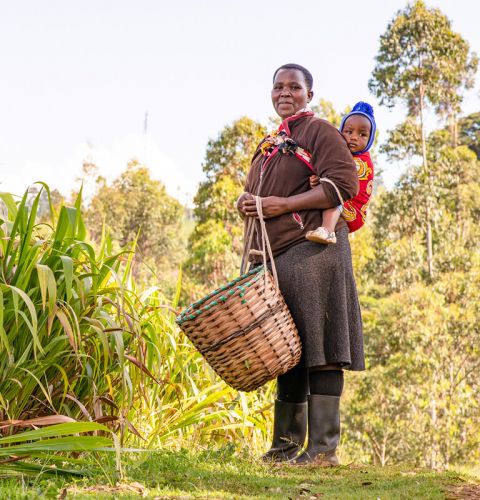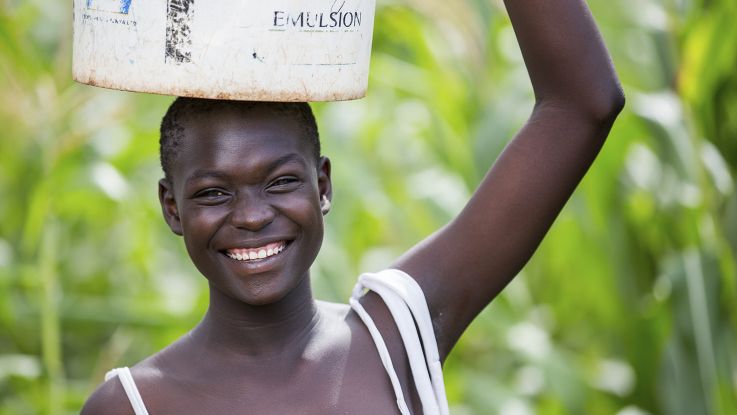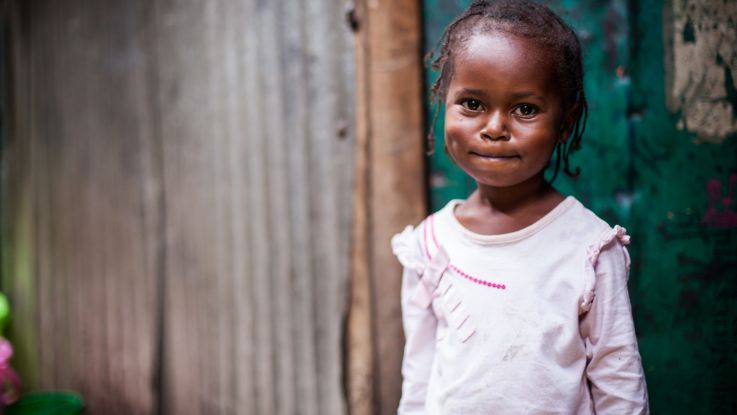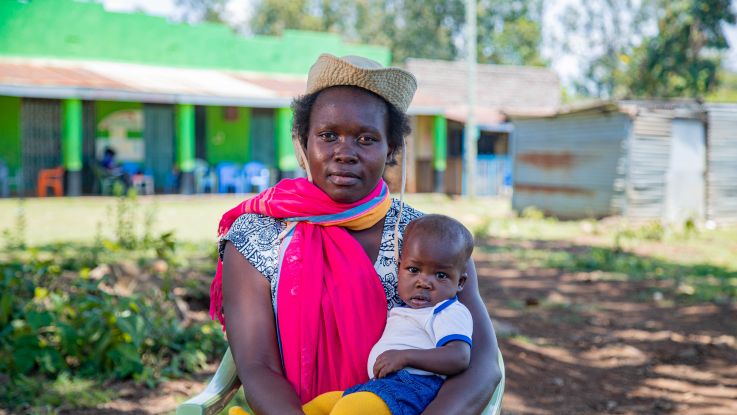Empowering tea communities in Kenya
Kenya and tea: the facts
Kenya is Africa’s largest producer of tea. Kenya is the third largest producer of tea in the world, behind only India and Sri Lanka. As a result, the crop plays a huge role in the country’s economy, with around three million people earning their livelihoods from the sector.
Approximately 60% of tea in Kenya is produced on small-scale family farms. Women smallholder farmers and informal workers play a vital role in the industry making up over 60% of the tea workforce.
About the partnership
In partnership with its member companies Taylors of Harrogate and Lavazza Professional, this three-year collaboration with the Ethical Tea Partnership will empower smallholder farmers and informal workers in three tea growing communities in Kenya.
Together ActionAid and Ethical Tea Partnership will consult farmers and workers to understand the issues they face and the impact of industry practices on their lives. We will also work directly with the Kenyan Tea Development Agency (KTDA) and other stakeholders to improve policies and working practices in the industry. Whilst 80% of programme participants will be women, we will also engage men as allies in all aspects of the programme.
What we are doing
In partnership we are:
Building an environment where human rights are upheld, protected and respected.
Ensuring the right policies are in place in the tea sector to ensure decent work and fair pay for farmers and workers.
Supporting farmers and workers to organise into Solidarity Groups and train Rights Champions to help others learn about and claim their rights.
Convening with key industry and government stakeholders so that farmers and workers can raise concerns and plan for and implement improvements.
Supporting women as they work to claim their right to freedom from violence.
Supporting the formation of women’s groups and networks amplify women’s voices, supporting women to challenge gender norms and discuss and claim their rights to freedom from violence.
Challenging gender-based violence and support survivors of violence to access essential services and legal aid.
Establishing a platform for dialogue with local government to advance women’s land rights, which are essential for raising women’s status and ending violence.
Training tea industry management to improve working practices and tackle gender-based violence.
Improving access to essential public services for tea workers and their families, including water, housing, healthcare and education.
Conducting a study on what is driving children to drop out of school and conducting a ‘Back to School’ campaign in partnership with the local government authorities.
Supporting Solidarity Groups to develop Community-Led Change Plans (CLCPs) and provide training so that they can hold local governments accountable for their commitments.
Improving the livelihoods for smallholder farmers and informal workers.
Supporting women smallholder farmers and informal workers to diversify their incomes through access to entrepreneurship training and finance.
Establishing a sustainable programmatic model for scale-up.
Working with Solidarity Groups, local government authorities and the Kenya Tea Development Agency to embed the programme within communities with the ambition of scaling up to more communities in future.
Through this partnership we aim to establish 45 Solidarity groups across the three communities and train 1,350 Rights Champions, 80% of whom will be women. These Rights Champions will help improve the lives of 22,000 farmers and workers and their families.
Together, we will also bring about structural change within the Kenyan tea sector by influencing policy changes that will have a positive impact on approximately 300,000 small-scale farmers and 600,000 informal tea workers in Kenya.
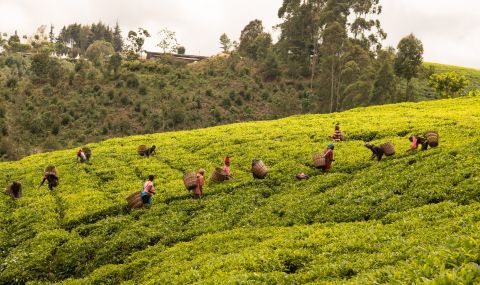
What we have achieved so far
Since the partnership started in January 2022, we have established 53 groups for smallholder farmers and informal workers in three communities. Through the groups 1,474 Rights Champions, 1,098 women and 376 men have been trained who in turn support others to learn about and claim their rights from the Duty Bearers, those people or institutions such as employers or government departments that have a responsibility to respect, promote and realise human rights. The groups have taken part in training on women’s rights and local government responsibility for providing essential public services, such as health care, education, water and housing that respond to the needs of women and girls.
Three multi-stakeholder platforms have been established, one in each community, providing networks that link communities to Duty Bearers (such as community leaders, government officials, child protection services, police and court prosecutors) and enable conversations around rights issues, child labour, sexual and gender-based violence, support for survivors of violence, and provision of improved public services by the government in tea growing communities. 202 Duty Bearers have been engaged through the multi-stakeholder platforms to date.
The platforms have been instrumental in establishing community-led local reporting mechanisms, providing channels for community members to report rights violations and have these addressed in a timely manner.
We have supported women and girls across the three communities to address gender-based violence, through training, regular meetings and strengthening women’s networks. 144 Women’s Champions have been trained and supported to train other members of the community through a training-of-trainers model. A total of 2,880 people so far have been reached with information on their rights and the laws and policies in place to prevent sexual and gender-based violence.
To date 231 survivors of violence have been supported to access justice through referrals to medical, psychosocial and legal support. Survivors’ networks have also been established, providing safe spaces for survivors to meet and share experiences, access support services, and discuss ways to increase their income through alternative options.
Rights Champions have been supported to develop Community Led Participatory Change Plans, submit Memoranda to their County Governments for their priority needs and participate in local government planning processes. As a result, communities have successfully secured local government commitments to build and maintain key roads, construct new classrooms, equip two hospitals with maternity wards, improve piped water, and build new public toilets in the project communities.
The project has also started a 'Back to School' campaign following a study produced by the project outlining the high prevalence of child labour in the programme communities. To date 131 children have been re-enrolled in school across the three programme locations. Recorded instances of child labour have reduced from 42 in 2023 to 32 between January and June 2024.
To improve livelihoods across the three communities, 47 groups have been supported to legally register and adopt the Village Savings and Loan Association (VSLA) model, enabling people to save and access loans to improve their incomes. Groups have also undergone training delivered by the Kenya Tea Development Agency to support them to diversify and improve their livelihoods.
The project has also undertaken research and developed a report on the status of women’s land ownership in the project communities. The report contains recommendations for promoting land ownership by women and is being used to ensure land rights issues are addressed through the multi-stakeholder platforms. To date, 49 women have been supported to seek justice on land rights.
The project has also completed reviews of key laws and policies in the tea sector, as well as laws and policies to protect women and girls from violence in Kenya, providing a useful tool to advocate for improvements in the sector and for policy violations to be addressed.
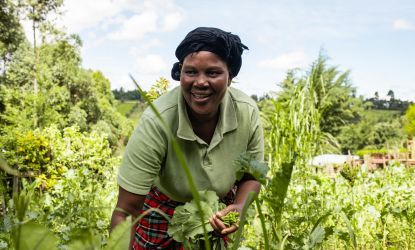
Improving the lives of tea pickers in Kenya
Agnes is a single mother of four. She works two jobs, as a tea picker and environment cleaner. She told us that before the project despite working 8am until midnight she still did not earn enough money to buy sufficient food or pay school fees. Sometimes she had to take her children to help pick tea, and they missed school.
"The wage has improved since we were able to speak with our employers who now give us an average of 9 KSh (0.05 GBP) per kilo of tea leaves. From the ActionAid training, we learned to practice table banking which allows us to take out loans to pay rent and do other things. Before, I would take all of my children with me to go and pick tea and would sometimes have to forget about school. Since I attended training with ActionAid, my children are consistently attending classes.
“It has become very difficult for perpetrators to get away with domestic violence because we are now aware of our rights as women. Cases [of sexual and gender-based violence] have significantly reduced because people are now confident enough to report them, and the perpetrators know that they can face legal action if they commit assault."
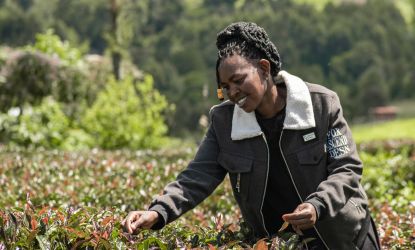
Empowering women to know and claim their rights
Nancy is a mother of four, a tea farmer and Chair of the Saramek Farmers Group. She tells us that being part of the group, which was set up with the support of ActionAid, has had a positive impact on her life and the lives of other women in her community.
“The training on rights has helped us because we were being mistreated before. Even in public participation forums we were silent or rarely attended the sessions at all. Now, when the forums are arranged, we attend, and we contribute to the discussions as women. Even our children have benefited [from the project] because they are all in school. Before, they would stay home to help us pick tea within the farms.”
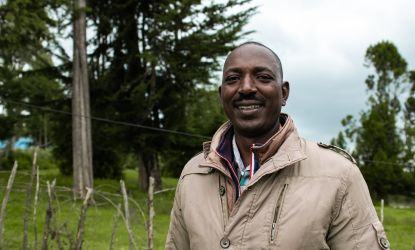
Rights for tea-pickers and farmers
Wesley is a tea picker and farmer in Nakuru County and the elected Chair of the local tea buying centre. He has seen great improvements in his community as a result of this project.
“The ActionAid project has prompted employers to ensure their workers are well. People now know their rights and have learned how to advocate for themselves.
"Cases of domestic violence in the community have been greatly reduced. Everyone now knows their rights and in case they are violated, we know where to go to report the incident. Children are no longer allowed to work within the farms or bring tea for weighing at the tea-buying centres. This is good because it ensures all under-18s go to school.”
Page updated 11 March 2025
